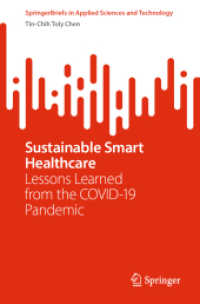- ホーム
- > 洋書
- > 英文書
- > Psychology
Full Description
Why do responses to terrorist attacks often perpetuate cycles of deadly violence?
Can an understanding of the psychology of these cycles help us to break them?
Drawing on clinical experience of the care of people and communities affected by violence and disasters and on advances in cognitive and dynamic psychology, attachment theory, group psychology and thanatology, this ground-breaking work by a prominent and varied array of contributors casts light on the causes of terrorism, the reasons why responses to deadly attacks easily give rise to or maintain cycles of violence and some ways to prevent and interrupt these cycles.
Using the violence in Northern Ireland and Rwanda as case studies throughout, Part 1, The Context of Terrorism, looks at the psychological and social influences behind extremism, terrorism and conflict. Part 2, Reponses to a Terrorist Attack, examines the responses that can feed a cycle of violence and assesses a range of approaches for their success in ending violence. Part 3, Breaking the Cycle, looks in depth at specific environments, influences and changes that can affect how violence can be prevented or mitigated, including the role of schools and the media and an examination of how peace processes were carried out in Northern Ireland and Rwanda. The book works to demonstrate how psychological responses to a terror attack can trigger unstable emotional responses and override judgement and to identify the five key points in a cycle of violence where change, for better or for worse, is possible.
Ideal for psychiatrists, thanatologists, palliative care and bereavement staff, politicians and journalists as well as anyone with an interest in terrorism and its causes, this is a thought-provoking and accessible work on a highly topical subject.
Contents
Contributors. Nathans, Foreword. Acknowledgements. C. M. Parkes, Introduction. Part I: The Context of Terrorism. C. M. Parkes, On the Psychology of Extremism. Abrahamson, Cognitive Psychology, Terrorism and Cycles of Violence. Alderdice, Group Identity and the Roots of Terrorism. Gribbin, Turtle, The Roots of Conflict in Northern Ireland. Hall, C. M. Parkes, The Roots of Conflict in Rwanda. Part II: Reponses to a Terrorist Attack. C. M. Parkes, Responses to Terrorism that Feed Cycles of Violence - A Model. Gribbin, Turtle, Bloody Sunday: Analysis of the Response. Hall, C. M. Parkes, Assassination in Rwanda. Part III: Breaking the Cycle. J. Parkes, Countering violence: the role of the school. Glees, Islamist Terrorism and British Universities. Rowan, Responses to Terrorism - The Role of the Media. Alderdice, Leadership. Gersons, Nijdam, Supporting Leaders under Threat and Protection. Gribbin, Turtle, Omagh and the Peace Process in Ireland. C. M. Parkes, Hall, After the Genocide: the Peace Process in Rwanda. C. M. Parkes, Synthesis and Conclusions. References.







